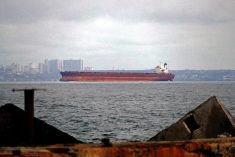Kyiv/Geneva | Reuters — The situation in the Red Sea has led to a slowdown in Ukrainian agricultural exports in January, agriculture minister Mykola Solsky said on Thursday.
“A big volume was (exported) in December… but the rate (in January) will drop,” Solsky told national television.
“There are problems in the Red Sea and part of our exports went and are going through the Red Sea to China, Asia and African countries and therefore the movement of ships has slowed down a lot,” he said.
Read Also

Russia’s seaborne grain exports fell 10 per cent year-on-year in September, data shows
Russia’s seaborne grain exports fell to 5.1 million metric tons in September, 10.1 per cent down on the same month of 2024, according to shipping data.
Attacks by Iran-allied Houthi militia in Yemen on ships in the region since November have slowed trade between Asia and Europe and alarmed major powers. The U.S. has begun strikes on Houthi sites aiming to degrade their ability to attack shipping in the Red Sea.
Solsky said an additional reason for lower shipments was the New Year holidays.
Ukraine exported 4.8 million metric tons of food via its Black Sea corridor in December, surpassing the maximum monthly volume exported under a previous U.N.-brokered grain deal.
Prior to Russia’s invasion in February 2022 Ukraine exported about 6 million tons of food per month via the Black Sea.
It now relies on the corridor along its western Black Sea coast near Romania and Bulgaria, its small ports on the Danube River, and exports over land via eastern Europe.
Kyiv believes it has managed to dislodge Russian forces from the western part of the Black Sea, securing grain exports which are crucial to its economy as well as for important imports.
Wheat shipments plunge
Wheat shipments via the Suez Canal fell by almost 40 per cent in the first half of January to 0.5 million metric tons due to attacks in the Red Sea and Gulf of Aden, the World Trade Organization said today on social media platform X (formerly Twitter).
The WTO data, based on a dashboard developed jointly by the International Grains Council (IGC) and the World Trade Organization, adds to signs of ship diversions following attacks on vessels by Iran-aligned Houthi militants in Yemen.
Earlier this week, shipping sources had said they expected some grain cargo diversions but that most would continue to risk passing through the Suez Canal which is the shortest shipping route between Europe and Asia.
In December, around 8 per cent of wheat shipments from the European Union, Russia and Ukraine that would typically travel via the Suez Canal followed alternative routes, the WTO said.
That surged to around 42 per cent in the first half of January, it said. Prior to the attacks, the share of alternative routes was only about 3 per cent on average, it said.
However, it appeared that few if any shipments were being cancelled altogether. “The surging number of diversions appears to have had a limited impact to date on total deliveries,” the WTO said.









